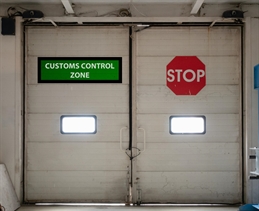
Belgium is gunning for a large chunk of international e-commerce flows into the European Union. In mid-June the Belgium Customs and Excise Department turned on its new BE-GATE customs platform. The portal was specially designed to facilitate and accelerate the clearance of cross-border e-commerce flows.
Free of charge for users, the portal can process large volumes of data to allow rapid clearance of customs applications and the simultaneous transmission of large numbers of arrival notifications. The official form used for these notifications also serves as a declaration of release for consumption for shipments not exceeding €22 (US$24.50) in value. On the export side BE-GATE can be used for shipments with a value of up to €1,000, as long as they weigh less than 1,000 kilos.
The system automatically notifies retailers whose shipments have been picked for customs inspection, while all others are released immediately.
The platform is live at the ports of Antwerp and Zeebrugge as well as the airports of Brussels and Liege, the country’s chief air cargo gateways.
The Belgian government gave a strong signal of its e-commerce ambitions last December, when it signed an agreement with Alibaba to jointly develop a trade platform to foster cross-border trade and supporting infrastructure at Liege airport. In a flanking move Cainiao Network signed a contract with Liege airport to lease a 220,000 sq m area to build a hub. The first facility on the site is expected to come on stream in 2021.
Brussels Airport already has a link to Belgian customs over its BRUcloud community platform. Steven Polmans, head of cargo and logistics, strategic development, expects this to become the preferred avenue for shippers and forwarders in Brussels to interact with the customs agency.
Several US airports have ambitions to turn themselves into gateways for e-commerce, and they have identified customs clearance as a key element to succeed.
The Columbus Regional Airport Authority in Ohio wants to set up an expedited customs clearance facility at Rickenbacker, the city’s cargo airport. In the opening stage this can be located in an existing building at the airport, but in the long run a dedicated facility will be needed, said chief commercial officer David Whitaker.
“Expedited customs clearance – that’s everything,” said one forwarder executive whose firm focuses strongly on e-commerce.
Most B2C shipments into the US do not require clearance, as their value is below the de minimis threshold of US$800 per day for personal US imports, but they still have to be declared and may be inspected by customs, so a smooth process to pass through customs is necessary, Whitaker said.
Dallas Fort Worth International Airport has also spied an opening. To date, the US Customs & Border Protection agency has not designated an import gateway for e-commerce entering Texas, said John Ackermann, executive vice-president of global strategy and development. With its international connections, including a raft of freighter links to Asia, the airport is in a strong position to fulfill this role.
In New York, Aircitypost, a provider of international shipping solutions to on-line merchants, has embraced the Air Automated Manifest System (Air AMS) from logistics technology provider Descartes for the express clearance for e-commerce shipments valued at US$800 or less.
“Using the Descartes Air AMS solution we’re helping an average of 1 to 2 million e-commerce shipments per month get to destination faster without increasing cost,” said Frank Aircitypost CEO Frank Casano.
Miami International Airport’s ambitions for e-commerce are a bit loftier than those at Dallas. Emir Pineda, manger of aviation trade and logistics, said that the airport’s strategic goal is to replicate its role in intra-regional trade and become the e-commerce hub for the Americas.
It took a big step in that direction earlier this year when it joined hands with Correios, the Brazilian postal service, for the agency’s Compra Fora (Buy Outside) offering to Brazilians who want to order online from foreign merchants. Under their agreement e-commerce parcels shipped through this expedited program from anywhere in the world are routed through Miami for pre-clearance and onward shipment to Brazil by Correios. This arrangement allows such shipments to enter Brazil as domestic cargo, cutting delivery from weeks or even months to days, the pair claim.
By Ian Putzger
Air Freight Correspondent | Toronto




